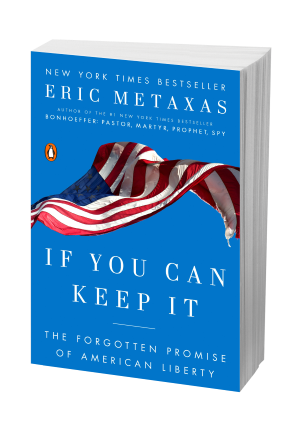Loving America
July 1, 2023

These brief excerpts are taken from the chapter titled Loving America in If You Can Keep It: The Forgotten Promise of American Liberty.
* *
When facing the death of the nation he clearly loved, Abraham Lincoln declared that it was “mystic chords of memory” that would hold us together, beyond the vast battlefields of horrors that lay ahead. The greatest test of our republic would rely not merely on our political institutions and on the great leader who was speaking those words but on something else. It would depend on our love for America. The ineffable idea of love for America would be the thing to heal us up beyond our difficulties and carry us together, North and South, ex- slave and free, into the future. What are we to make of this: that love of country was, in the estimation of Lincoln, crucial to the survival of America? Did Lincoln not himself earnestly believe that? Was he merely calculating that this sentiment would operate on the hearts of that generation, a generation susceptible to such ideas? Or perhaps he did sincerely believe it, but we do not, in our more sophisticated age? Or is this idea of loving one’s country rather an eternal verity that must be remembered and relearned, lest we fail to survive our current trials, which are great? Is it possible that unless we remember and relearn how to love our country that it will die by suicide, as Lincoln warned—or prophesied—in his 1837 speech at the Springfield Young Men’s Lyceum?
Lincoln’s other statements would lead us to conclude that he dearly and deeply believed what he was saying about love of country, and simple logic obliges us to face the idea that nothing has changed to make this idea—this requirement—any less important to the survival of our country today. But perhaps in order for us to remember how to love our country and to relearn how to do so, we need to ask ourselves exactly what it means to love one’s country. Perhaps it is our understanding of this idea itself that has changed.
The first question to ask is how can we plausibly be expected to “love” a country we now know to be guilty of so many things? Ronald Reagan once said, “If we forget what we did, we won’t know who we are.” This is true. Seeing ourselves as we are is vital if we are to “keep the republic” as Franklin enjoined us to do that day in Philadelphia. But knowing who we are means we must know both the positive things and the negative.
Since roughly the 1960s the negative things have come to the fore in unprecedented ways. As the war in Vietnam escalated, we increasingly began to see ourselves in a negative light: as a people who had oppressed our native peoples, and who had tolerated the great moral evil of slavery, and who had allowed horrible racial injustices to continue long after that institution had been abolished. We had denied women the vote for well over a century and had gotten involved in a war that for the first time forced many of us to question whether we could be seen as the “good guy” on the world stage. In many ways, seeing these bad things about ourselves was an extraordinarily positive development, in that we ought to own up to and deal with the worst of what we’ve done and who we have been.
But the real problems arose when we somehow split into two camps over this and fell into a perpetual ideological battle. One side seemed only to be able to see the bad things America had done, and seemed to have become enamored of the negative narrative that cast us as the great villain on the world stage; and the other side seemed only to be able to see the faults with that narrative, and seemed to have become enamored of the positive narrative that cast us as the great savior of the world. This perpetual ideological battle has become a dangerous thing for America and for the world both. To truly love America, one must somehow see both sides simultaneously… What is the true view of America and how can we see it? We must also ask—if we believe God exists or might exist—what his view of America would be. And what does God think about patriotism and love of country?.. Jesus called his followers to “do unto others as you would have others do unto you,” which, of course, presupposes a healthy kind of self-interest. But in the last decades in the United States of America and in other parts of the West, this fundamental idea has been forgotten. We have bought into the false choice of either loving our country or loving others, when it seems that we cannot properly love others and help others unless we love ourselves and help ourselves first. If we truly love others and want to help others, we must see that the two are inextricably intertwined. So can we take a healthy pride in ourselves again, if we understand what that really means? Can Americans see our way back to loving ourselves in a way that at its core desires to extend that love to others?
